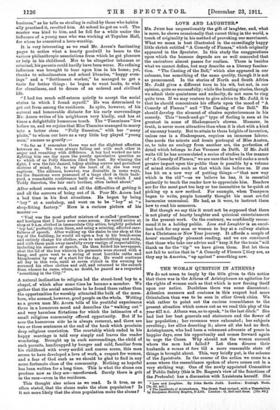LOVE AND LAUGHTER.*
Ma. JUDD has unquestionably the gift of laughter, and, what is more, he shows occasionally that rarest thing in the world, a touch of originality in his method of provoking our merriment. What we mean is best illustrated in the exceedingly happy little sketch entitled "A Comedy of Flames," which originally appeared in the Spectator. In this study the exaggerations upon which the humour depends are so well concealed that the caricature almost passes for realism. There is besides what we cannot define, but may describe as a literary fascina- tion. " The Casting of the Bell," which also appeared in our columns, has something of the same quality, though it is not so pronounced. In the stories of North and South Africa Mr. Judd gives a different turn to his wit, but not, in our opinion, quite so successfully; while the hunting stories, though we admit their quaintness and audacity, do not seem to ring quite true. If we may venture to give advice to Mr. Judd, it is that he should concentrate his efforts upon the mood of "A Comedy of Flames " and " The Casting of the Bell." He should develop the element of elusive mysteriousness in his comedy. This " touch-and-go " type of fooling is seen at its greatest in some of Shakespeare's clowns. Humour, in truth, is never more attractive than when it is shot with a kind of uncanny beauty. But to attain to these heights of invention, unless one is a Shakespeare, requires an immense labour. One needs the minute and ironic portrayal of Miss Austen, or, to take an analogy from another art, the perfection of detail which belongs to Jan Vermeer de Delft. If Mr. Judd waits till he has accumulated a series of studies in the manner of "A Comedy of Flames," we are sure that he will make a much greater impact upon the public than is possible by a volume of mixed studies such as that which lies before us. If one has hit on a new way of putting things —" that new way which is the old "—as we believe he has, it is essential patiently to teach the reader how to appreciate him. Readers are for the most part too lazy or too insensitive to be quick at picking up a new method. For example, when Tennyson began to write, people honestly thought his most art-ful harmonies unmusicaL He had, as it were, to instruct them how to read his measures.
But though we say this it must not be supposed that there is not plenty of hearty laughter and quizzical entertainment in the present work. On the contrary, we confidently recom- mend it to a holiday public. Love and Laughter is an excel- lent book for any man or woman to buy at a railway station for a Christmas or New Year journey. It affords a couple of hours' exceedingly pleasant reading, and we are convinced that those who take our advice and " keep it for the train "will thank us for the " tip " we have given them. But let them not fail to notice that in "A Comedy of Flames they are, as they say in America, "up against" something new.


































 Previous page
Previous page